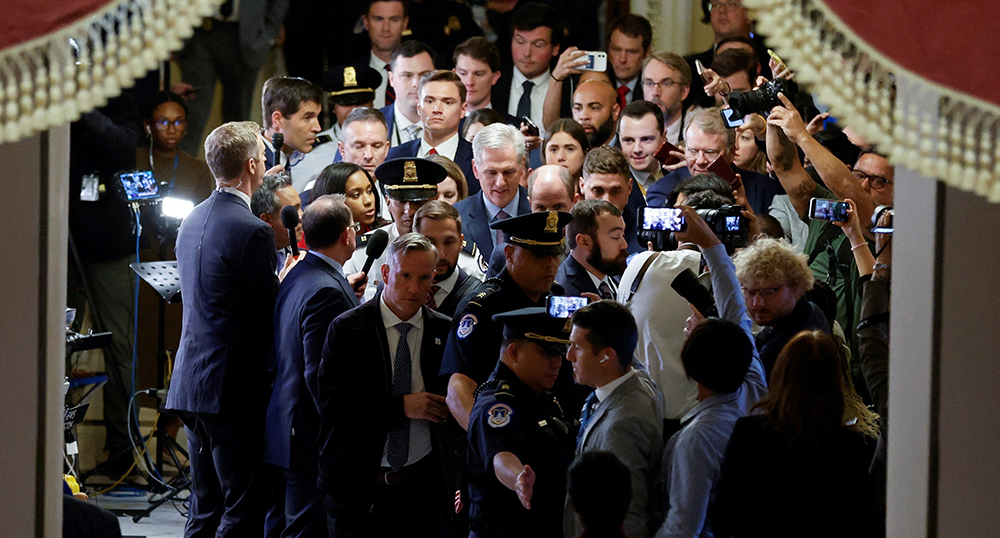
By Kate Scanlon
WASHINGTON (OSV News) — California Rep. Kevin McCarthy was ousted as speaker of the House of Representatives Oct. 3 in a historic vote that may have an impact on Catholic concerns.
Eight House Republicans joined with Democrats to remove McCarthy from the role, the first such ouster in the history of the U.S. House, setting the stage for a contentious process to elect a new speaker. The ouster left House Republicans without a clear successor to lead their fractured majority.
Political analysts and economists — and some Republican senators — have raised alarm that the turmoil in the House may increase the prospects of a government shutdown in November. Advocacy groups and the U.S. Conference of Catholic Bishops have cautioned against a shutdown, urging lawmakers to come to an agreement and keep the government open. The U.S. bishops expressed concern that a government shutdown could impact the poor and vulnerable, as well as ministry to U.S. military personnel.
Congress averted a shutdown Sept. 30 by passing a brief continuing resolution that funds the government at current spending levels through Nov. 17. However, the House cannot conduct other business until it elects a new speaker, and a void in that role reduces the time lawmakers have to come to an agreement to prevent a shutdown later this year.
Majority Leader Steve Scalise of Louisiana, who is Catholic, has announced a bid for speaker. Scalise, who was shot and wounded in a 2017 shooting at a congressional baseball practice and is currently battling cancer, alluded to overcoming challenges in a letter to colleagues announcing a bid for speaker.
“When I was shot in 2017, it was Members of this Conference who saved my life on that field,” he wrote. “When I made it to the hospital and my family was told my chances of surviving were low, it was the prayers from all of you that carried us through. When I was in the hospital for nearly 15 weeks, it was the possibility of getting back to work with all of you that kept me motivated to get better. During that time, I was often asked why after nearly losing my life because of this job I would want to go back. But it was never a question for me: I love this country, and I believe we were sent here to come together and solve the immense challenges we face. As I face new challenges, I feel even more strongly about that today.”
Acknowledging the coming weeks will be “some of the most arduous times we will face together,” Scalise wrote, “this Conference is worth fighting for — we cannot lose sight of our shared mission.”
“Now, more than ever, we must mend the deep wounds that exist within our Conference and focus on our objectives so we can get back to work for the millions of people who are counting on us,” he said.
Former President Donald Trump, in the midst of his third bid for the White House, first signaled he may be interested in the speakership temporarily, as the speaker is not required to be a member of Congress, but later endorsed House Judiciary Chairman Jim Jordan of Ohio.
“He is STRONG on Crime, Borders, our Military/Vets, & 2nd Amendment,” on his social media platform. “Jim, his wife, Polly, & family are outstanding – He will be a GREAT Speaker of the House, & has my Complete & Total Endorsement!”
Jordan has been endorsed by several McCarthy allies, but his alliance with Trump, as well as allegations that Jordan knew some of the Ohio State wrestlers he coached were being sexually abused, which he has denied, could jeopardize his bid with moderates.
Meanwhile, Democratic Minority Leader Hakeem Jeffries argued moderates should join with Democrats to form a bipartisan coalition to lead the House.
“It was my sincere hope that House Democrats and more traditional Republicans would be able to reach an enlightened arrangement to end the chaos in the House, allowing us to work together to make life better for everyday Americans while protecting our national security,” he wrote in a piece for the Washington Post.
Earlier that same week, California Gov. Gavin Newsom appointed Laphonza Butler, president of the abortion advocacy group Emily’s List, to California’s U.S. Senate seat left vacant by the recent death of longtime Democratic Sen. Dianne Feinstein.
Butler, also a Democratic strategist and former adviser to Vice President Kamala Harris’ 2020 presidential campaign, was sworn into the upper chamber by Harris the same day as McCarthy’s ouster, becoming the only Black woman currently in the Senate and the first person who identifies openly as LGBTQ+ to represent California as a U.S. senator.
Newsom’s appointment of Butler brought criticism from one prominent pro-life leader, Marjorie Dannenfelser, president of SBA Pro-Life America, who said, “The last thing Washington needs is another rubber stamp for the brutal abortion industry.”
The late Feinstein died the evening of Sept. 28 at her Washington residence, according to her office. She was 90. Feinstein was known as the author of the 1994 assault weapons ban, chair of the Senate Intelligence Committee and ranking member of the Senate Judiciary Committee, as well as a prominent Senate investigator of the CIA’s use of torture after the 9/11 attacks.
Butler’s appointment has the potential to impact an already ongoing primary for the Senate seat next year, should she choose to enter that race, which also includes Democratic U.S. Reps. Adam Schiff, Barbara Lee and Katie Porter of California.
